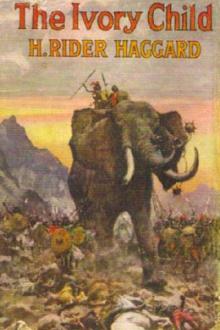The Ivory Child by H. Rider Haggard (best contemporary novels TXT) 📕

- Author: H. Rider Haggard
- Performer: -
Book online «The Ivory Child by H. Rider Haggard (best contemporary novels TXT) 📕». Author H. Rider Haggard
man devils I had met in plenty, but never a single angel--at least, of the male sex. Also there was always the possibility that I might get a glimpse of the still more angelic lady to whom he was engaged, whose name, I understood, was the Hon. Miss Holmes. So I said that nothing would please me more than to see this castle.
Thither we drove accordingly through the fine, frosty air, for the month was December. On reaching the castle, Mr. Scroope was told that Lord Ragnall, whom he knew well, was out shooting somewhere in the park, but that, of course, he could show his friend over the place. So we went in, the three of us, for Miss Manners, to whom Scroope was to be married very shortly, had driven us over in her pony carriage. The porter at the gateway towers took us to the main door of the castle and handed us over to another man, whom he addressed as Mr. Savage, whispering to me that he was his lordship's personal attendant.
I remember the name, because it seemed to me that I had never seen an
Free e-book «The Ivory Child by H. Rider Haggard (best contemporary novels TXT) 📕» - read online now
Similar e-books:





Comments (0)